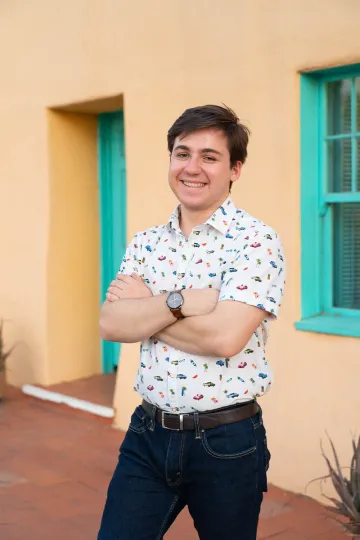Andrew's Quest Project - Home Sweet Home, That I Own: A Review of the Literature on Homeownership Expansion Programs Across the US and what Lessons Can Be Learned for Southern Arizonan Jurisdictions

Andrew is a First Year Franke Wildcat double majoring in Philosophy, Politics, Economics, and Law (PPEL) and Economics and minoring in Spanish.
Tell us about your Quest Project:
My journey in research began last fall in my first semester at UArizona. I was looking for ways to get involved in research, and I wanted to take a class to get myself acclimated to research practices and to participate in an area that I had no experience in. I had done some research in high school in my senior year, but I wanted to get started with basic research practices. I found Dr. Brian Mayer’s Tucson Poverty Workshop class. In the course, we as students interviewed Pima County residents that had received emergency rental assistance over COVID. We talked to families about their experiences over the pandemic, and what caused them to seek help. We found that families had lost loved ones, were unemployed, had medical issues, and lacked access to healthy foods and affordable housing. The course culminated in all of us getting into groups and organizing ourselves based on different poverty topics (housing, food security, childcare, etc.) My group looked at eviction prevention and the impact evictions have on the communities of Southern Arizona. For our last class meeting, we hosted a community forum at Habitat for Humanity’s Tucson office. We met individuals from nonprofits, the city and county, and also landlords. The forum was an amazing opportunity to bring different stakeholders together to discuss what solutions can be created in our communities. After taking the course, I wanted to continue working in the poverty space to find more solutions. Dr. Mayer was part of a new working group, the Prosperity Working Group, which was starting in
January 2023, and he was looking for a group of research assistants to help him with the working group. The group is a consortium of City of Tucson and Pima County officials that are working together to develop policies that will promote prosperity throughout Southern Arizona. I had applied to become one of Dr. Mayer’s research assistants, and I ultimately choose to do my Quest Project with him. Tori Nardinelli had told me about the Quest Program as a way to get honors credit for my research, and to try my hand at presenting my research to others. I was introduced to Tori through her husband Joey. I had taken UNIV 101 with Joey who introduced my classmates and I to many resources and opportunities within the Honors College, including Quest. For the first part of the project, Dr. Mayer and my fellow colleagues and I wrote up a policy framework on benefits delivery throughout the region. We made recommendations on what actions both jurisdictions could take if they wanted to improve how low-income families can access needed government benefits (for example, SNAP, WIC, etc.) and our policy framework is being reviewed by the Tucson City Council and the Pima County Board of Supervisors.
For the second half of our work with Dr. Mayer, research assistants are pursuing their own topics within the poverty space. This is where my Quest Project comes in. I am looking at what policy solutions can be used by Pima County and the City of Tucson for creating more lasting homeownership opportunities across Southern Arizona. Homeownership is one of the best ways to build both familial and community wealth, which makes it one of the many effective tools we have in our toolbox for solving poverty. I decided on this topic since I think it is another piece of the poverty puzzle that needs to be looked at more, and I am interested in getting a better idea of how college students, and other low-income individuals, can afford homes later on in their lives. This area of work is hard (socio-legal analysis) since it is difficult to study poverty. It is so prevalent across society that it needs to be approached from many different angles. I am grateful to Tori for all her guidance, and for Dr. Mayer to lead me through all of this.

